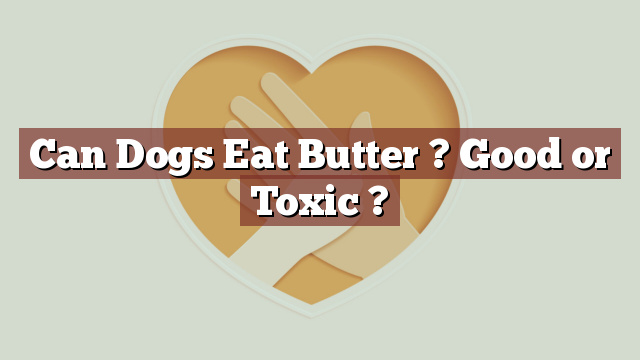Can Dogs Eat Butter? Good or Toxic?
As responsible pet owners, it is essential to be mindful of what foods we feed our furry companions. Dogs have different nutritional needs compared to humans, and certain foods that are safe for us may be harmful to them. In this article, we will explore whether dogs can safely consume butter, and if so, in what quantities.
Nutritional Value of Butter for Dogs: Fats, Vitamins, and More
Butter is predominantly composed of fats, primarily saturated fats. While fats are an important part of a dog’s diet, it is crucial to maintain a balance to prevent obesity and other related health issues. Butter also contains small amounts of vitamins A, D, E, and K, which are essential for overall health. However, it is worth noting that these vitamins are already present in most commercial dog foods, making the additional intake from butter unnecessary.
Can Dogs Eat Butter Safely? Expert Opinions and Research Findings
No, dogs should not consume butter. Despite its appealing aroma and taste, butter is not considered safe for canine consumption. The high fat content in butter can lead to digestive upset, including diarrhea and vomiting. Furthermore, excessive consumption of butter can contribute to weight gain, pancreatitis, and other serious health problems in dogs.
Expert opinions and research support the notion that butter should be avoided in a dog’s diet. Veterinarians unanimously agree that butter is not a suitable food for dogs and should be kept out of their reach.
Potential Risks and Benefits of Feeding Butter to Dogs
Feeding butter to dogs can pose several risks and minimal benefits. The high fat content in butter can lead to obesity, which can subsequently increase the risk of joint problems, heart disease, and diabetes in dogs. Additionally, the excess fat can put a strain on the pancreas, potentially causing pancreatitis.
While butter does contain some vitamins, these nutrients can be obtained from a well-balanced commercial dog food diet, which is specifically formulated to meet a dog’s nutritional needs. Therefore, the potential benefits of feeding butter to dogs are greatly outweighed by the risks involved.
My Dog Ate Butter, What Should I Do? Steps to Take and Monitoring
If your dog accidentally consumes a small amount of butter, it is unlikely to cause significant harm. However, if your dog ingests a large quantity of butter or shows symptoms such as vomiting, diarrhea, or abdominal discomfort, it is essential to contact your veterinarian immediately. They will be able to provide guidance on the necessary steps to take and monitor your dog’s condition closely.
Conclusion: Butter as an Occasional Treat, but Caution is Key
In conclusion, it is best to avoid feeding butter to dogs altogether. While a small amount of butter as an occasional treat may not cause immediate harm, the potential risks associated with its consumption outweigh any benefits it may provide. Always prioritize your dog’s health and consult with a veterinarian before introducing any new food into their diet. Remember, a balanced and specially formulated diet is crucial for keeping our canine companions happy and healthy.
Thank you for investing your time in exploring [page_title] on Can-Eat.org. Our goal is to provide readers like you with thorough and reliable information about various dietary topics. Each article, including [page_title], stems from diligent research and a passion for understanding the nuances of our food choices. We believe that knowledge is a vital step towards making informed and healthy decisions. However, while "[page_title]" sheds light on its specific topic, it's crucial to remember that everyone's body reacts differently to foods and dietary changes. What might be beneficial for one person could have different effects on another. Before you consider integrating suggestions or insights from "[page_title]" into your diet, it's always wise to consult with a nutritionist or healthcare professional. Their specialized knowledge ensures that you're making choices best suited to your individual health needs. As you navigate [page_title], be mindful of potential allergies, intolerances, or unique dietary requirements you may have. No singular article can capture the vast diversity of human health, and individualized guidance is invaluable. The content provided in [page_title] serves as a general guide. It is not, by any means, a substitute for personalized medical or nutritional advice. Your health should always be the top priority, and professional guidance is the best path forward. In your journey towards a balanced and nutritious lifestyle, we hope that [page_title] serves as a helpful stepping stone. Remember, informed decisions lead to healthier outcomes. Thank you for trusting Can-Eat.org. Continue exploring, learning, and prioritizing your health. Cheers to a well-informed and healthier future!

